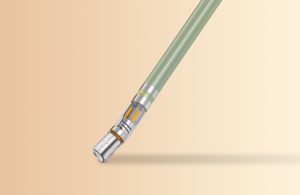
Biosense Webster today announced the first cases with its investigational Thermocool SmartTouch SF dual energy catheter for treating AFib.
The system enables doctors performing an ablation to toggle between two types of energy: pulsed-field and radiofrequency. It appears to be the Johnson & Johnson MedTech subsidiary’s answer to the dual energy ablation tech coming out of Affera, which competitor Medtronic acquired for $1 billion last year.
Dr. Tom De Potter performed the first procedure with Thermocool SmartTouch at OLV Hospital in Aalst, Belgium. Biosense Webster said Dr. Mattias Duytschaever of AZ Sint-Jan Brugge Oostende AV performed several additional cases. The Brugge, Belgium, hospital is also taking part in the clinical trial.
“While radiofrequency ablation has decades of safety and efficacy data to support it, pulse field ablation is a novel technology that shows promise in advancing the safety and ease of catheter ablation procedures; the versatility of a dual-energy catheter would give electrophysiologists the choice of using either one or both modalities at their fingertips,” said De Potter. “In caring for patients with AFib, my goal is to deliver a treatment that is maximally safe and efficient at the same time, and this dual-energy system may give me the ability to switch between radiofrequency and pulsed-field and customize treatment during a procedure to deliver the most appropriate energy.’’
Biosense Webster designed Thermocool SmartTouch SF for dual energy pulsed-field/radiofrequency ablation. It’s evaluating the PF/RF ablation system as part of the SmartfIRE study. SmartfIRE evaluates the system for treating drug-refractory, symptomatic paroxysmal AFib during standard electrophysiology mapping and ablation procedures.
About the Biosense Webster ablation procedure
To treat disorders like AFib, pulsed-field ablation utilizes a controlled electric field to selectively ablate cardiac tissue causing irregular heartbeats. This occurs through a process called irreversible electroporation (IRE). Its potential advantages versus radiofrequency ablation or cryoablation include the characteristic that heart muscle tissue can be especially susceptible to it. Meanwhile, other types of surrounding tissue are injury resistant. Read more about pulsed-field ablation here.
Biosense Webster aims to evaluate its Thermocool SmartTouch catheter and TruPulse generator. The steerable, multi-electrode, luminal, irrigated catheter holds CE mark for use in catheter-based cardiac electrophysiology mapping. It also has European approval for cardiac ablation when used with an RF generator. TruPulse provides both RF energy and novel, uni-polar, bi-phasic pulse sequence to the catheter by toggling the two energy sources on the generator monitor.
The combination of Thermocool SmartTouch and TruPulse is not available for sale in any region. Biosense Webster’s study is investigating the combination’s transmission of PF or RF energy to the catheter tip electrode for ablation. Both integrate with the Carto 3 system.
Data from this study could add to a growing body of evidence from Biosense Webster in support of PF ablation for AFib. The company last month reported early success in a clinical trial for its VariPulse catheter and TruPulse generator.
Pulsed-field ablation continues to garner interest
Medtronic announced yesterday that its PulseSelect pulsed-field ablation (PFA) system exceeded its safety performance goal in a clinical trial. Alongside studies from Biosense Webster and from Boston Scientific for its Farapulse ablation technology, the space continues to excite.
Analysts noted that Medtronic’s study featured more rigorous AFib monitoring and endpoints compared to studies evaluating the Boston Scientific Farapulse and the Biosense Webster VariPulse systems. BTIG analyst Marie Thibault also pointed to other PFA devices in Medtronic’s portfolio. That includes the Sphere-9 PFA system from Affera.
“We remain bullish on PFA as a technology class and note there are several other public and private players developing competing approaches,” Thibault said.
Celine Martin, Johnson & Johnson group chair, cardiovascular & specialty solutions (CSS) group, oversees Biosense Webster’s AFib work. At DeviceTalks West in October 2022, she described pulsed-field ablation as a new chapter in the “ablation book.” Biosense Webster’s dedication in the AFib treatment space has made it a major provider of RF ablation tech. Now, Martin said, the goal is to “provide clinicians with the same portfolio that exists today in radiofrequency and make it PF-enabled.”
Martin echoed the same sentiments in today’s news release: “As a long-standing leader in the field of cardiac ablation, we are working to bring forward a versatile, best-in-class portfolio of pulsed-field ablation solutions – complementary to our radiofrequency ablation catheter portfolio – to address various ablation strategies in the treatment of atrial arrhythmias.”